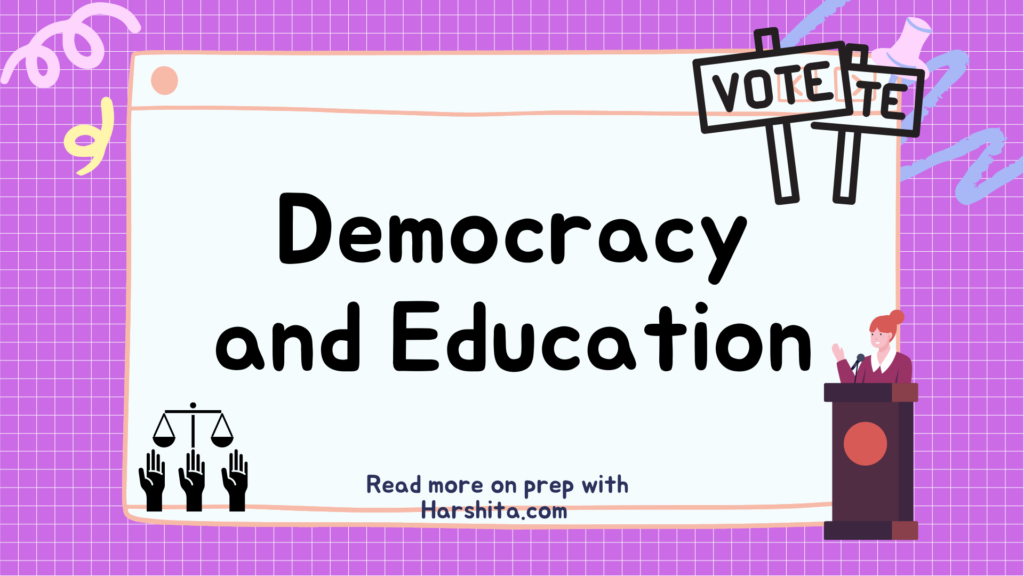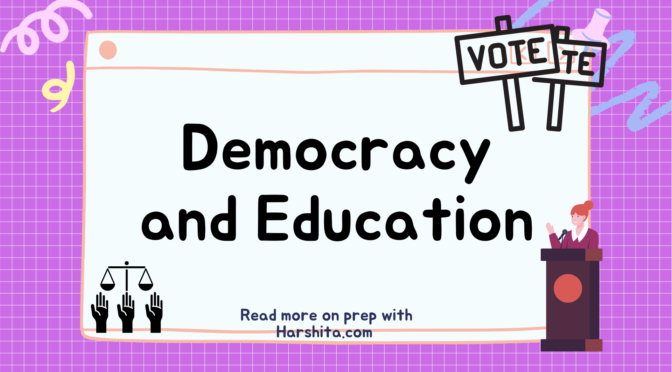Democracy and education are two interconnected concepts that play a crucial role in shaping societies and individuals. In this response, we will explore democracy and education in detail, discussing their relationship and significance.
Democracy: Democracy is a form of government in which power is vested in the people, who exercise it either directly or through elected representatives. It is characterized by the principles of political equality, popular participation, and protection of individual rights and freedoms. In a democratic society, citizens have the right to participate in decision-making processes, express their opinions, and hold their leaders accountable. Democracy promotes the idea of a government that is for the people, by the people, and of the people.
Education: Education is a process of acquiring knowledge, skills, values, and attitudes through various forms of learning. It plays a vital role in personal development, social progress, and nation-building. Education encompasses formal schooling, as well as informal and non-formal learning experiences that occur throughout an individual’s life. It equips individuals with the tools they need to understand the world, engage in critical thinking, make informed decisions, and contribute meaningfully to society.
Relationship between Democracy and Education: Democracy and education are closely linked and mutually reinforcing. Here are some key aspects of their relationship:
- Informed Citizenship: Education plays a crucial role in nurturing informed citizens who can actively participate in democratic processes. It helps individuals develop critical thinking skills, understand diverse perspectives, and engage in informed debates. A well-educated population is more likely to make rational decisions and contribute positively to the democratic process.
- Equal Opportunities: Education is a means to provide equal opportunities for all individuals, irrespective of their social background or economic status. In a democratic society, education should be accessible and inclusive, ensuring that every citizen has the chance to acquire knowledge and skills necessary to participate fully in social, political, and economic life.
- Tolerance and Respect: Education promotes values such as tolerance, respect, and empathy. By fostering an understanding of diverse cultures, beliefs, and viewpoints, education helps create an inclusive society where individuals respect each other’s rights and freedoms. This is essential for the functioning of a healthy democracy, as it encourages dialogue and cooperation among different groups.
- Social Mobility: Education is often seen as a pathway to social mobility. It provides individuals with opportunities to enhance their socio-economic status and improve their quality of life. In a democratic society, education should be accessible to all, regardless of their socio-economic background, allowing individuals to overcome barriers and achieve upward mobility.
- Critical Thinking and Civic Engagement: Education nurtures critical thinking skills and encourages civic engagement. It enables individuals to analyze social and political issues, understand their rights and responsibilities, and actively participate in democratic processes such as voting, community involvement, and advocacy for social change. Informed and engaged citizens are the foundation of a vibrant democracy.
Conclusion:
Democracy and education are interdependent pillars that support the development of a just and inclusive society. Education empowers individuals to participate meaningfully in democratic processes. It promotes social cohesion, and helps build a society based on principles of equality, justice, and freedom. Conversely, democracy provides the framework and environment necessary for education to flourish and fulfill its potential in shaping responsible citizens.
Also Read: Culture and Education

Also Visit: Prep with Harshita


Best notes
https://dday.tistory.com/794